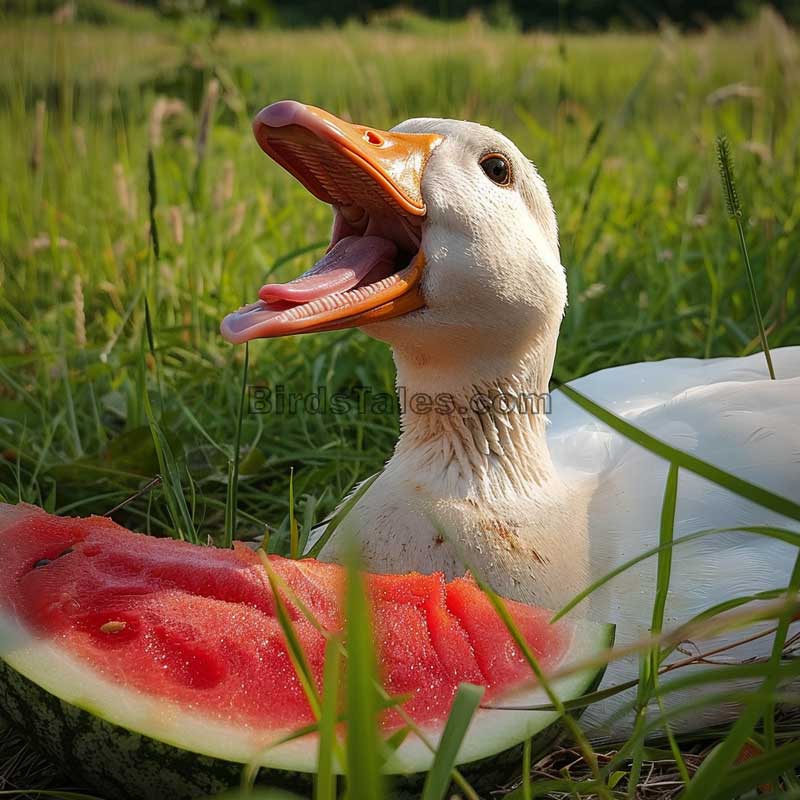Nutritional Benefits of Watermelon for Ducks
Watermelon isn’t just tasty for humans.
Ducks can also enjoy its refreshing sweetness.
Here’s why watermelon can be good for ducks:
Hydration and Heat Relief
Ducks need lots of water.
Watermelon is packed with water, making it perfect for keeping ducks hydrated, especially in the heat.
It’s like giving them a mini water bottle in fruit form.
When the sun is blazing and the pond feels like a hot tub, ducks appreciate a cool, juicy bite.
The high water content in watermelon helps maintain their hydration levels, which is vital during hot summer days.
Ducks don’t sweat like humans; they rely on their environment and what they eat to stay cool.
Watermelon acts as a natural coolant, helping them stay comfortable and refreshed.
Vitamins and Health
Watermelon has important vitamins that boost a duck’s health:
- Vitamin A: Essential for good eyesight and healthy skin. Ducks need sharp vision to spot food and predators. Vitamin A supports their vision, ensuring they can see clearly, especially in dim light. Plus, it keeps their feathers and skin in top shape.
- Vitamin C: Boosts the immune system. Ducks, like us, need a strong immune system to fight off illnesses. Vitamin C helps ward off infections and keeps their overall health robust. It also aids in repairing tissues and healing wounds, which is important if they get injured.
These vitamins help ducks stay healthy and strong.
A diet rich in vitamins ensures ducks remain active and vibrant, ready to waddle around happily.
Risks of Feeding Watermelon to Ducks
While watermelon has perks, there are some risks.
Knowing these helps you keep your ducks safe.
Choking Hazards
Seeds can be a problem.
They might cause ducks to choke.
Always choose seedless watermelon or remove the seeds before feeding.
Safety first! Even though ducks are good at pecking and foraging, watermelon seeds are slippery and can easily get lodged in their throats.
This can lead to panic and distress for your feathered friends.
By opting for seedless varieties, you remove this risk entirely.
It’s a small step that makes a big difference in their safety.
Digestive Concerns
Too much watermelon can upset a duck’s stomach.
Overfeeding can cause diarrhea, leading to dehydration.
Moderation is key.
Think of watermelon as a treat, not a main meal.
Ducks have delicate digestive systems that can get overwhelmed with too much fruit.
While watermelon is hydrating, it’s also high in sugars, which ducks don’t need in large amounts.
An overindulgence can lead to loose stools, making them uncomfortable and potentially sick.
Keep an eye on their droppings; if you notice they’re runny, cut back on the watermelon.
Feeding Guidelines
Follow these tips to make sure your ducks enjoy watermelon safely.
Preparation Tips
- Remove seeds: Use a spoon to scoop out seeds. No seeds, no choking. Carefully removing the seeds ensures you’re giving your ducks a safe snack. Take a few extra minutes to check for any hidden seeds, especially in those tricky corners.
- Cut into small pieces: Ducks don’t chew like us. Small chunks are easier to eat. Cutting the watermelon into bite-sized pieces makes it easier for ducks to swallow and digest. It’s similar to how we’d prefer small bites of food rather than trying to eat a whole apple at once. This also helps in portion control, preventing them from eating too much too quickly.
Serving Size and Frequency
- Small servings: A little goes a long way. A few small pieces per duck are enough. Think of watermelon as a dessert rather than the main course. A couple of pieces each day is a fun and refreshing way to add variety to their diet without overloading them with sugar.
- Occasional treat: Offer watermelon once in a while. Stick to their regular diet most of the time. Ducks thrive on a balanced diet that includes grains, vegetables, and proteins like insects. Watermelon should be a special treat, similar to how we might enjoy ice cream occasionally. Keeping their diet varied ensures they get all the nutrients they need without over-relying on any single food.
Conclusion
Yes, ducks can enjoy watermelon, but with some rules.
It’s a fun and refreshing treat when given in moderation.
Always remove seeds and keep portions small.
Your ducks will thank you!
Got ducks? Tried feeding them watermelon? Share your stories and tips!




